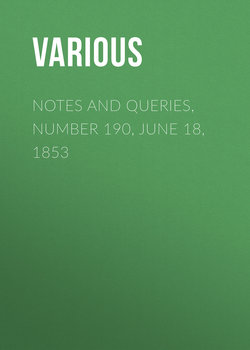Читать книгу Notes and Queries, Number 190, June 18, 1853 - Various - Страница 6
Notes
SHAKESPEARE'S USE OF THE IDIOM "NO HAD" AND "NO HATH NOT."
Оглавление(Vol. vii., p. 520.)
We are under great obligations to the Rev. Mr. Arrowsmith for his very interesting illustration of several misunderstood archaisms; and it may not be unacceptable to him if I call his attention to what seems to me a farther illustration of the above singular idiom, from Shakspeare himself.
In As You Like It, Act I. Sc. 3., where Rosalind has been banished by the Duke her uncle, we have the following dialogue between Celia and her cousin:
"Cel. O my poor Rosalind! whither wilt thou go?
Wilt thou change fathers? I will give thee mine.
I charge thee, be not thou more grieved than I am.
Ros. I have more cause.
Cel. Thou hast not, cousin:
Pr'ythee be cheerful: know'st thou not, the duke
Hath banish'd me, his daughter?
Ros. That he hath not.
Cel. No hath not? Rosalind lacks, then, the love
Which teacheth thee that thou and I are one.
Shall we be sunder'd," &c.
From wrong pointing, and ignorance of the idiomatic structure, the passage has hitherto been misunderstood; and Warburton proposed to read, "Which teacheth me," but was fortunately opposed by Johnson, although he did not clearly understand the passage. I have ventured to change am to are, for I cannot conceive that Shakspeare wrote, "that thou and I am one!" It is with some hesitation that I make this trifling innovation on the old text, although we have, a few lines lower, the more serious misprint of your change for the charge. I presume that the abbreviated form of the = ye was taken for for yr, and the r in charge mistaken for n; and in the former case of am for are, indistinctness in old writing, and especially in such a hand as, it appears from his autograph, our great poet wrote, would readily lead to such mistakes. That the correction was left to the printer of the first folio, I am fully persuaded; yet, in comparison with the second folio, it is a correct book, notwithstanding all its faults. That it was customary for men who were otherwise busied, as we may suppose Heminge and Condell to have been, to leave the correction entirely to the printer, is certain; for an acquaintance of Shakspeare's, Resolute John Florio, distinctly shows that it was the case. We have this pithy brief Preface to the second edition of his translation of Montaigne:
"To the Reader
"Enough, if not too much, hath beene said of this translation. If the faults found even by myselfe in the first impression, be now by the printer corrected, as he was directed, the work is much amended: if not, know that through mine attendance on her Majesty, I could not intend it; and blame not Neptune for my second shipwracke. Let me conclude with this worthy man's daughter of alliance: 'Que t'ensemble donc lecteur?'
Still Resolute John Florio."
S. W. Singer.
Mickleham.
Shakspeare (Vol. vii., p. 521.).—May I ask whether there is any precedent (I think there can be no excuse) for calling Shakspeare's plays "our national Bible"?
A Clergyman.
